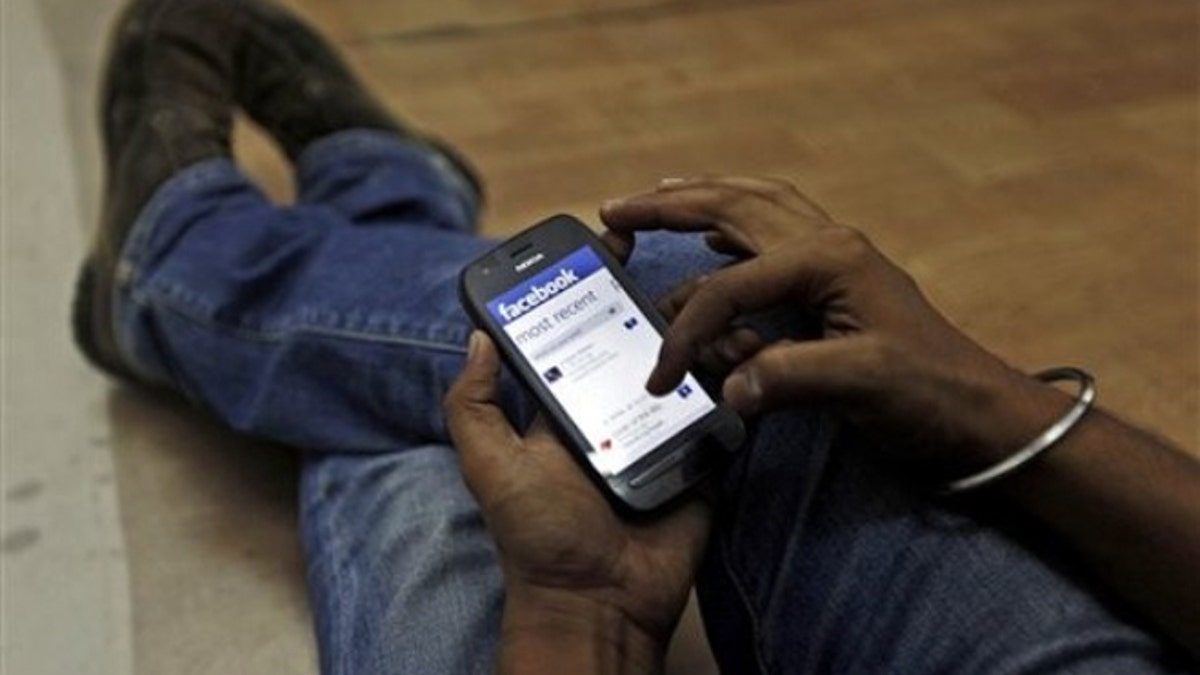
May 18, 2012: A man surfs the Facebook site on his mobile phone. (AP Photo/ Rajanish Kakade)
As I recently wrote, forces of technology and media are conspiring to deprive children, teenagers and young adults of their genuine feelings, intentions and empathy — essentially, making them trade in reality for logging into a Facebook fantasy of having hundreds or thousands of friends, launching a flurry of narcissistic Tweets about their comings and goings, playing at being pro athletes on Xbox and watching “reality TV” shows about people just like them, who are faking being real.
This prepares a whole generation to join our Entitlement Nation, where untold millions don’t believe in their genuine abilities anymore, and don’t even know how to go about finding them, because there is no GPS system that will map out a path to self-esteem and no app that tests your courage.
How can you avoid raising a citizen of Entitlement Nation, one of the deluded narcissists expecting to take home another “participation trophy” just for showing up to most of the tournament?
[pullquote]
Resisting the drugs intoxicating our children is, of course, part of the formula. Limiting their exposure to iPhones (which have nothing to do with the core “I” that matters, by the way), computer games, reality TV, Facebook and Twitter is no different than trying to limit their exposure to street drugs. Because marijuana and Facebook have a lot in common: they both get users high by conveying them away from their real concerns — including who they really are as people.
One way to limit exposure is to insist on technology-free windows during the day — even if that starts with breakfast and dinnertime. But another way is to simply start verbalizing your beliefs that these forces are no friends of empowerment. They aren’t cool. They aren’t amazing. They’re toxic, disempowering and numbing. And kids can still hear what you believe and say, if you say it with conviction.
Another way to avoid raising a citizen of Entitlement Nation is to communicate powerful emotions to your child. Tell them plainly the strengths you’ve witnessed in them, the moments you worried they weren’t being true to themselves and the challenges you think they need to overcome. When you say you love them (and you should), make sure that sometimes you have a hand on each of their shoulders and that you’re looking them straight in the eyes. That’s one very good antidote to the hours they stare into a computer screen.
State your opinions about the world, too. Take sides. Don’t go along to get along. Genuine beliefs, duly considered and powerfully presented, are insulation against the brain freeze of political correctness.
Encourage them to say what they think and believe, too. Listen attentively to their answers, then ask a few questions designed to help them to dig deeper into their thoughts and feelings.
Don’t be afraid to write them follow-up notes — with pen and paper. Tell them you’ve been thinking about what they said and have a few thoughts. That piece of paper, with words written out, in ink, by you, using your time and intellect, is something that they can hold onto, for real.
Get kids outside. Nature still isn’t being scripted. Feeling the way a cold wind can chill their bones or the sun can warm their faces, has a chance to awaken real thoughts in their minds and real emotions in their hearts. There’s a thematic reason why, in myth, vampires — the living dead — come out only at night. Real light, not illuminated pixels, is the enemy of darkness.
If you can afford it, own pets. They need to be cared for — for real. A pet responds to genuine emotion and offers it in return. A beagle howling at a crow in the yard has a chance to effectively silence the synthetic sounds of Club Penguin and Angry Birds.
Get kids involved in competitive sports and live performance (whether theater, singing, dance or debate). Because you can’t deny whether you missed two easy goals in hockey or fought back to tie the game from two goals down. And you either hit a high note on the stage or you don’t. The look on people’s faces will be a good antidote for Facebook.
All this, of course, is only a beginning. We face the most dangerous epidemic of all time: An epidemic of unreality that threatens to steal away what it means to be human, alive, true to ourselves and others. But it is a beginning. Because every act of intention is an answer to the actors among us, who coax us to play parts ourselves and, ultimately, to measure our worth by gifts given to us by government, not those myriad, miraculous gifts with which we were born.








































